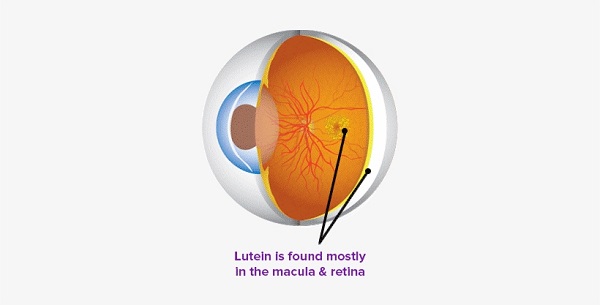
Its anti-inflammatory properties protect the eyes from vision loss. It also improves cognitive functions, cardiovascular health, and lowers the risk of cancer. Moreover, helps recover from many chronic diseases by its rich antioxidant contents.
This eye vitamin or Vitamin A is highly effective to prevent age related macular degeneration (AMD), cataracts, and loss of vision. It is a phytonutrient and a part of beta-carotene that gives vibrant green and yellow colour in vegetables and fruits.
High fat meal influences the metabolism and absorption of lutein in the digestive system of the human being. To augment the availability of lutein, the nutraceutical and herbal industry have marketed many products in the form of multivitamins tablet. (1)
Table of Contents
Sources of Natural Lutein
Lutein is present in foods high in antioxidants like:
- Orange
- Grapes
- Kiwi
- Corn
- Squash
- Broccoli
- Zucchini
- Egg yolk
Also read- Role of Antioxidants in Fighting Diseases
Where is it Found in Human Eye?
The only dietary carotenoids found in the human eye are lutein. It is present in the retina and macula region of the eyes. The macula is a region present in the back of the eye, which is responsible for vision. Therefore, lutein is also known as macular pigment. (2)
Varied Health Benefits of Lutein
Lutein has numerous other benefits like:
- Protects from diabetic retinopathy and premature retinopathy
- Recovers and prevents myopia or short-sightedness
- Protects from age-related macular degeneration
- Cataracts
- Protects from dry eyes syndrome
- Prohibits inflammation
- Recovers oxidative stress by fighting against free radicals
- Improves vision loss
- Improves visual contrast sensitivity or the ability to distinguish between an object and its background
- Reduces eye cell loss or death
- Protects from impairment of vision by harmful blue light
- Benefits cardiovascular health
- Develops cognitive performance (3)
What Should Be the Dose Of Lutein?
The Food and Drug Administration stated lutein as generally regarded as Safe. They estimated that one may consume 1-2mg of lutein regularly. However, patients with AMD may take 10mg. Council for Responsible Nutrition stated that a maximum of up to 20mg is advisable.
One must take the advice of a dietician or physician before taking any dietary supplement or medicine. (4)
How is Lutein Absorbed by Human Body?
Lutein is best ingested with high fat content foods. Lipoprotein of low density acts as a transport vehicle for absorbing lutein. (5)
Source of Lutein Supplements
Lutein supplements come from extracts of marigold flowers mixed with mineral oil. It can also be created synthetically. Raw lutein extracts are available with nutraceutical extracts manufacturers. By processing it with other therapeutic components the finished products of lutein dietary supplements are manufactured.
Anzen Exports is a trader and exporter of nutraceutical extracts across the globe. We handpick superlative quality of products and cater those to our clients in a competent commercial value. Check our range of nutraceutical extracts on our website. Read our upcoming blog to know more about the efficacy of different nutrients and their related dietary sources.
Disclaimer:
Anzen Exports’ blog posts are based just on our research from cited websites. To be best informed, we advise consulting a doctor about an ingredient or medicine prior to taking it.
Sources:
- NCBI
Website – https://www.ncbi.nlm.nih.gov/pmc/articles/PMC6164534/ - Healthline
Website – https://www.healthline.com/health/lutein-for-eyes#bottom-line - WebMD
Website – https://www.webmd.com/vitamins/ai/ingredientmono-754/lutein - Drugs.com
Website – https://www.drugs.com/npp/lutein.html - Science Direct
Website – https://www.sciencedirect.com/science/article/pii/S1756464619306954
